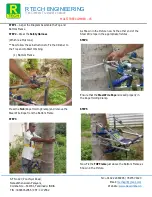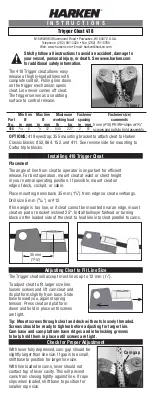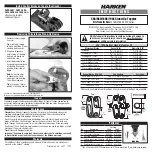
Assembly and connection
27
Assembly Instructions
Linear Tables HT-L
HTL-01-0-EN-1905-MA
When securing the HT-L linear table, mount the axis on a flat surface and make sure that the mounting points are aligned
with each other so that the necessary flatness of 0.2 mm/m is achieved.
6.1.2 Reference surface accuracy requirements
The T nuts to be used for each axis size are given in Table 6.1. The T nuts must be arranged as per Fig. 6.8, Fig. 6.9, Fig. 6.11,
Fig. 6.12 or Fig. 6.13. The required number of T nuts depends on the external load. To calculate the required number, the load
values listed in Table 6.1 (clamping force per T nut; permissible axial operating force in tension direction per T nut) must be
taken into account. Don’t drop below the minimum number of T nuts specified in Table 6.1. The T nuts are to be positioned
grouped in the form of mounting points as shown in Fig. 6.11, Fig. 6.12 and Fig. 6.13. Make sure that each mounting point
for itself transmits the external load safely. The distances between the mounting points are to be selected depending on the
load situation. The recommended distances L
NX
listed in Table 6.1 are only reference values.
6.1.3 Assembly with T nuts
Note the hole spacing L
NY
when securing the linear tables.
X
Drill mounting holes in the mounting surface (hole spacing listed in Table 6.1).
X
Clean mounting surface and position linear table on it.
X
Swivel the T nut into the bottom groove.
X
Secure the T nut with a small tightening torque on the bolts.
X
Now tighten the bolts with the full tightening torques, proceeding in a crosswise manner.
9
9
The linear table has now been installed.
L
NY
F
A
L
NY2
L
NY1
F
A
Precision requirements for all reference surfaces for securing the axis profile.
0.2 mm/m
Fig. 6.8
Hole spacing for securing the linear tables HT150, HT200 with a T nut from below
Fig. 6.9
Hole spacing for securing the linear tables HT250 with a T nut from below
















































